Ethnic Nationalities (252 found)
Burma Army must be held accountable for extrajudicial killing of seven villagers in Mong Yaw
On June 25, 2016 about 100 Burmese troops from Light Infantry Battalion (LIB) 362 arrived at the village of Mong Yang (about 10 kms west of Mong Yaw) from the Namjalarp-Loi Tao area (in the north). From Mong Yang, the troops walked in a line along the road east towards Mong Yaw […]
• • •Achieving Health Equity in Contested Areas of Southeast Myanmar
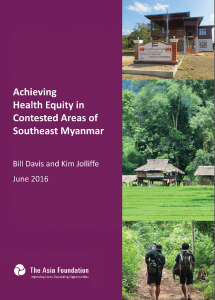 Throughout decades of ethnic armed conflict, the governance environment in many of Myanmar’s non- Burman areas has become deeply fractured, as ethnic armed organizations (EAOs) have established parallel governance systems, including healthcare departments. This report gives an overview of the parallel Ministry of Health (MoH) and EAO-linked health systems that exist in southeast Myanmar, and looks at how coordination and cooperation have increased since ceasefires were signed in 2011 and 2012 […]
Throughout decades of ethnic armed conflict, the governance environment in many of Myanmar’s non- Burman areas has become deeply fractured, as ethnic armed organizations (EAOs) have established parallel governance systems, including healthcare departments. This report gives an overview of the parallel Ministry of Health (MoH) and EAO-linked health systems that exist in southeast Myanmar, and looks at how coordination and cooperation have increased since ceasefires were signed in 2011 and 2012 […]
Our Customary Lands
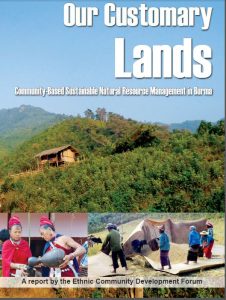 In January 2016 the government adopted a National Land Use Policy, which included the recognition of customary land management practices. While this is a welcome fi rst step in the necessary integration of Burma’s customary land management systems with the national-level system, there is an urgent need for constitutional reform and devolution of land management powers prior to any such integration […]
In January 2016 the government adopted a National Land Use Policy, which included the recognition of customary land management practices. While this is a welcome fi rst step in the necessary integration of Burma’s customary land management systems with the national-level system, there is an urgent need for constitutional reform and devolution of land management powers prior to any such integration […]
2016 Trafficking in Persons Report – BURMA: Tier 3
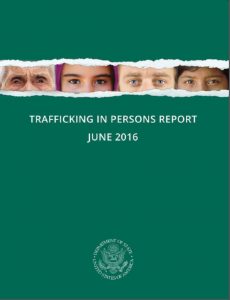 Burma is a source country for men, women, and children subjected to forced labor and for women and children subjected to sex trafficking, both in Burma and abroad. Some Burmese men, women, and children who migrate for work abroad—particularly to Thailand and China, as well as other countries in Asia, the Middle East, and the United States—are subjected to forced labor or sex trafficking […]
Burma is a source country for men, women, and children subjected to forced labor and for women and children subjected to sex trafficking, both in Burma and abroad. Some Burmese men, women, and children who migrate for work abroad—particularly to Thailand and China, as well as other countries in Asia, the Middle East, and the United States—are subjected to forced labor or sex trafficking […]
New Report: Military Confiscation of Burmese Ancestral Land in Karenni State
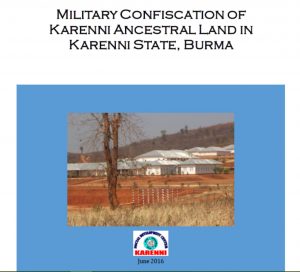 This report is based on direct testimony provided through interviews with 40 villagers between February 16 and March 28, 2015 […]
This report is based on direct testimony provided through interviews with 40 villagers between February 16 and March 28, 2015 […]
Human Rights Watch: “They Can Arrest You at Any Time” The Criminalization of Peaceful Expression in Burma
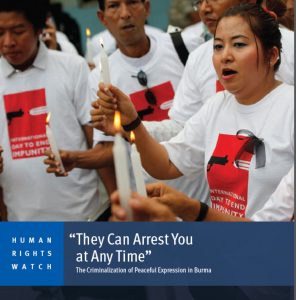 The past five years have been a time of liberalization and change in Burma. The abolition of prior censorship and a loosening of licensing requirements has led to a vibrant press, and the shift from formal military rule has emboldened civil society […]
The past five years have been a time of liberalization and change in Burma. The abolition of prior censorship and a loosening of licensing requirements has led to a vibrant press, and the shift from formal military rule has emboldened civil society […]
TRAINED TO TORTURE: Systematic war crimes by the Burma Army in Ta’ang areas of northern Shan State (March 2011 – March 2016)
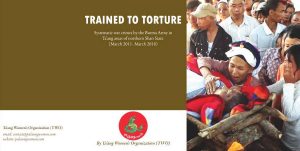 TWO documentation of human rights violations in Ta’ang areas of northern Shan State from March 2011 to March 2016 provides evidence that the Burma Army is committing war crimes, on a widespread, systematic basis – in particular torture, shelling of civilian targets, and forcing civilians to be porters and human shields […]
TWO documentation of human rights violations in Ta’ang areas of northern Shan State from March 2011 to March 2016 provides evidence that the Burma Army is committing war crimes, on a widespread, systematic basis – in particular torture, shelling of civilian targets, and forcing civilians to be porters and human shields […]
Animation: From Refugees to IDPs: Untold Story of Displacement Cycle in Burma
၁၉၉၄ ခုႏွစ္တြင္ ျမန္မာႏုိင္ငံဘက္ျခမ္းသို႔ အတင္းအဓမၼ ျပန္ပုိ႔ခံရေသာ မြန္ဒုကၡသည္မ်ား၏ ဒုကၡခံစားရပုံကုိ ဘားမားလင့္ ႏွင့္ ျမန္မာ႔အေရးပူးေပါင္းေဆာင္ရြက္သူမ်ားအဖြဲ႔တုိ႔မွ “ဒုကၡသည္မွသည္ ျပည္တြင္းတိမ္းေရွာင္ ဘ၀သုိ႔ – ျမန္မာႏုိင္ငံမွ ဥေပကၡာျပဳခံ ေနရပ္မွဖယ္ရွားခံရမႈ သံသရာ” ေခါင္းစဥ္ျဖင့္ ကာတြန္းသရုပ္ျပ တင္ဆက္ထားပါသည္ […]
• • •Report of the United Nations High Commissioner for Human Rights: Situation of human rights of Rohingya Muslims and other minorities in Myanmar
The present report, submitted pursuant to Human Rights Council resolution 29/21, examines the situation of human rights of Rohingya Muslims and other minorities in Myanmar […]
• • •Torture, extrajudicial killing, and use of civilians as human shields by Burma Army during new offensive against SSPP/SSA near Upper Yeywa dam site in Kyaukme
During May 2016, the Burma Army has committed grave human rights violations, which meet the definition of war crimes, during a new offensive against the Shan State Progress Party/Shan State Army (SSPP/SSA) in Kyaukme township, northern Shan State, close to the Upper Yeywa dam site on the Namtu/Myitnge river […]
• • •
 All posts
All posts